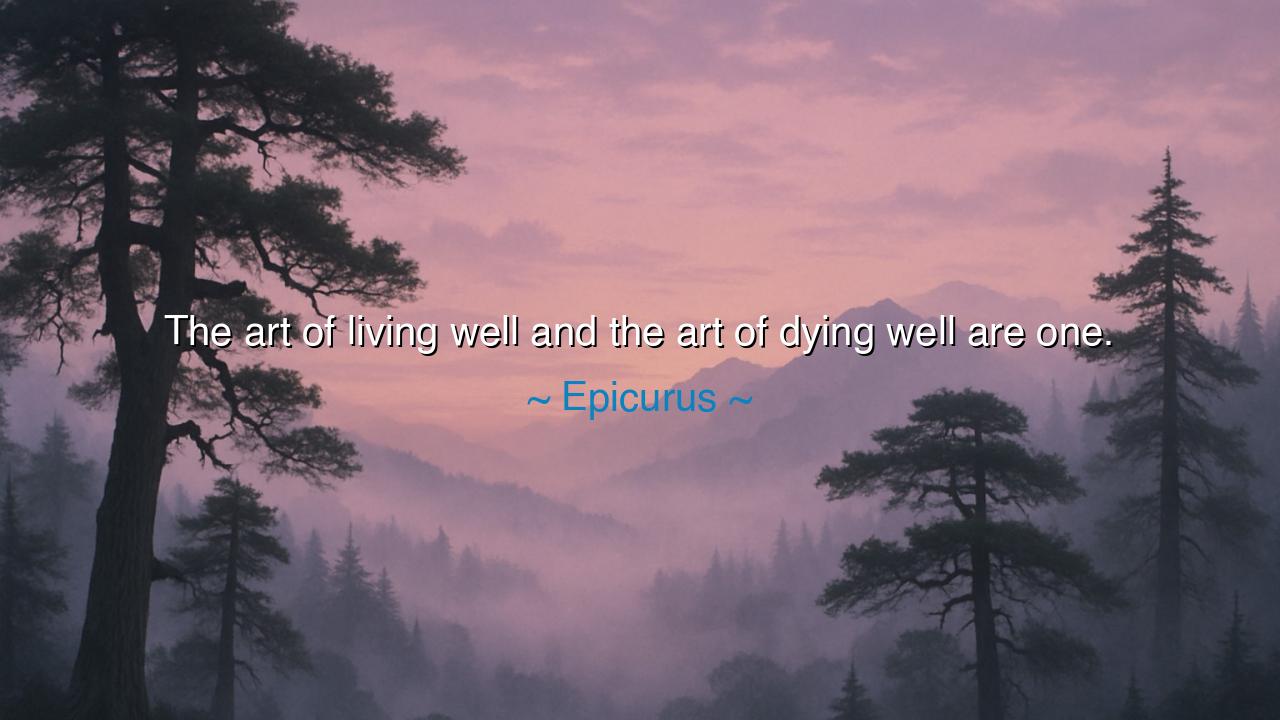
The art of living well and the art of dying well are one.






Host: The room was still, the quiet only broken by the soft ticking of the clock on the wall. Jack sat with his hands folded in his lap, his gaze distant as he pondered a thought. Jeeny, sitting across from him, noticed his pensive mood and set her cup of tea down, sensing that something important had caught his attention.
Jeeny: (gently) “You seem lost in thought. What’s on your mind?”
Jack: (looking up slowly, his voice soft) “I was just reflecting on a quote from Epicurus. He said, ‘The art of living well and the art of dying well are one.’ It really made me think about how the way we live shapes the way we approach death — that both are intertwined, and how we live our lives has a lot to do with how we face the end.”
Host: Jeeny’s expression softens as she takes in Jack’s words, the quiet in the room deepening as she considers the meaning of the quote. She leans forward, her fingers lightly tracing the rim of her cup.
Jeeny: “That’s such a profound thought, isn’t it? It’s like he’s saying that to live well, to truly live, you have to also embrace the idea of death — not as something to fear, but as part of life. The art of living well isn’t just about joy or success, it’s about being at peace with the inevitable and carrying that peace through every moment.”
Jack: (nodding) “Exactly. Epicurus is suggesting that the way we live, the choices we make, and the peace we find in our daily lives directly influence how we face death. If we live with integrity, mindfulness, and acceptance, then when the time comes, we won’t be overwhelmed by fear. Instead, we’ll approach death the same way we’ve approached life — with grace, calm, and acceptance.”
Host: Jeeny smiles softly, her gaze turning inward as she reflects on the connection between life and death. The conversation feels more intimate now, the understanding of the quote slowly settling in.
Jeeny: “It makes me think about how often we avoid thinking about death or fear it. But maybe Epicurus is reminding us that the more we embrace life — all of it, even its fleeting nature — the more we can approach death with a sense of peace, as just another transition, another part of the cycle.”
Jack: “Yeah, and living well doesn’t mean avoiding the hard parts. It’s about living with awareness, accepting both the beauty and the inevitable endings that come with it. If we live with that awareness, death isn’t something that disrupts us; it’s something that feels like a natural continuation.”
Host: Jeeny takes a deep breath, her eyes softening as she considers the deeper layers of what Jack has said. The quiet in the room feels more profound now, as if they’ve unlocked a deeper understanding of life and death.
Jeeny: “I think it’s about living authentically, isn’t it? When we’re true to ourselves and embrace life fully, we’re also preparing ourselves to face the end with that same authenticity — not with fear, but with a sense of peace, knowing we’ve lived well.”
Jack: (smiling softly) “Exactly. It’s about living with intention, understanding that our time here is finite, and using that knowledge to make the most of every moment. In doing so, we not only live well, but we also approach death with a sense of peace, knowing we’ve done what we could with the time we had.”
Host: The conversation settles into a calm silence, the realization that life and death are not separate, but intimately connected. Epicurus’ words are a reminder that the way we live shapes the way we face death, and that by living fully and authentically, we can approach both with peace and acceptance.






AAdministratorAdministrator
Welcome, honored guests. Please leave a comment, we will respond soon